人教版八年级上册Unit2 How often do you exercise?Section B 3a-3c 课件(共45张PPT)
文档属性
| 名称 | 人教版八年级上册Unit2 How often do you exercise?Section B 3a-3c 课件(共45张PPT) | 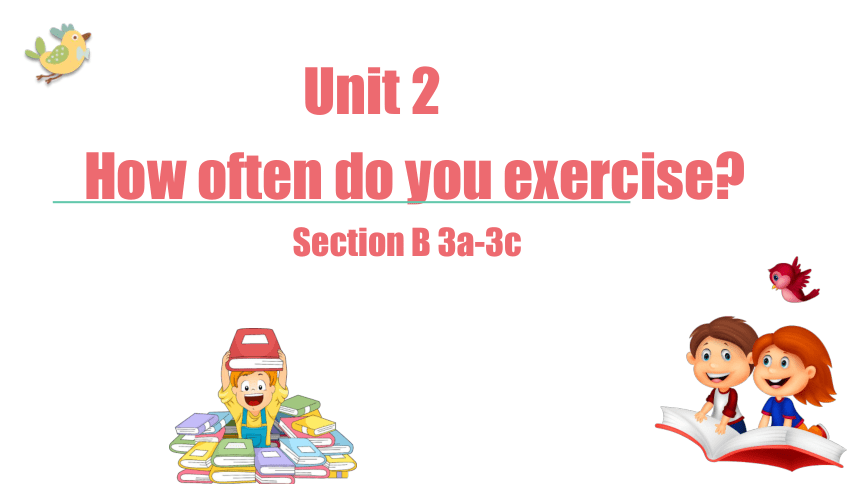 | |
| 格式 | zip | ||
| 文件大小 | 28.5MB | ||
| 资源类型 | 教案 | ||
| 版本资源 | 人教新目标(Go for it)版 | ||
| 科目 | 英语 | ||
| 更新时间 | 2022-09-26 08:48:21 | ||
图片预览

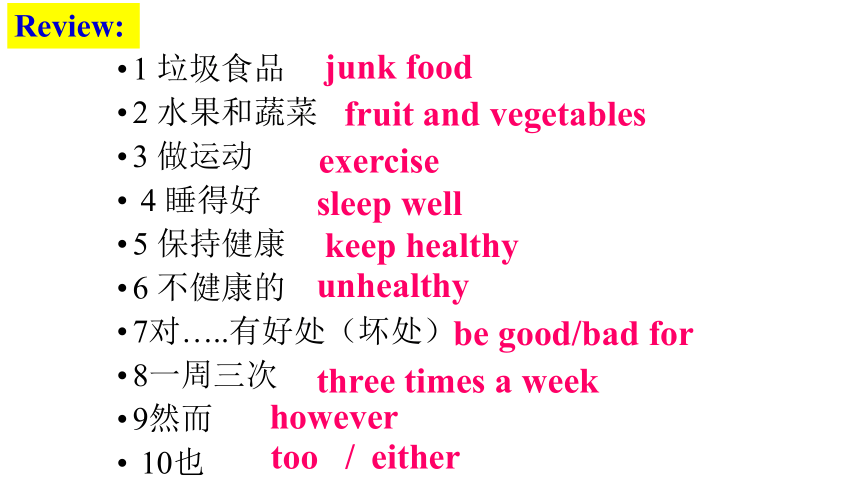
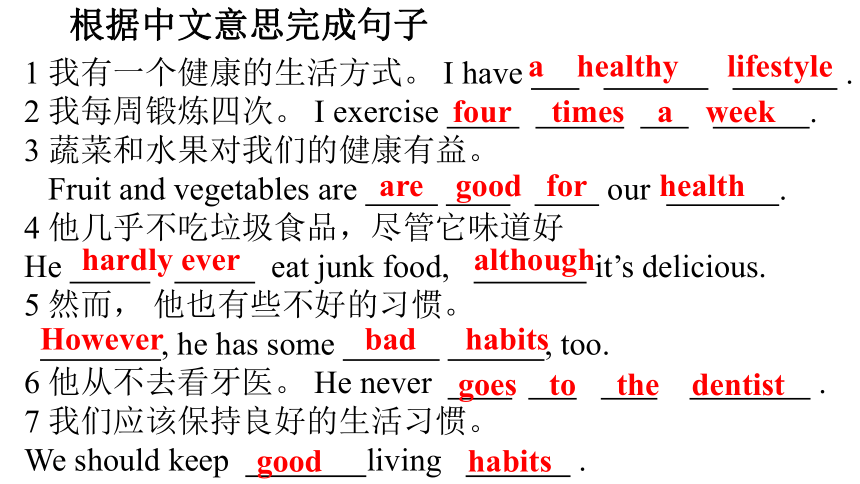

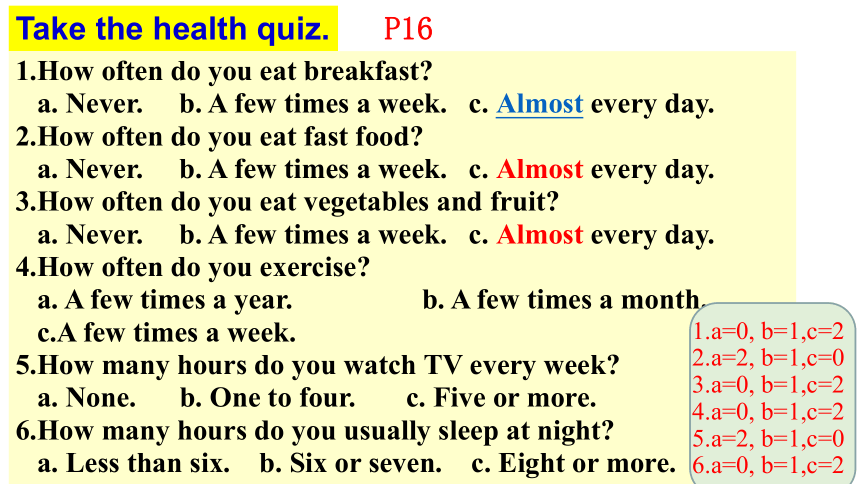
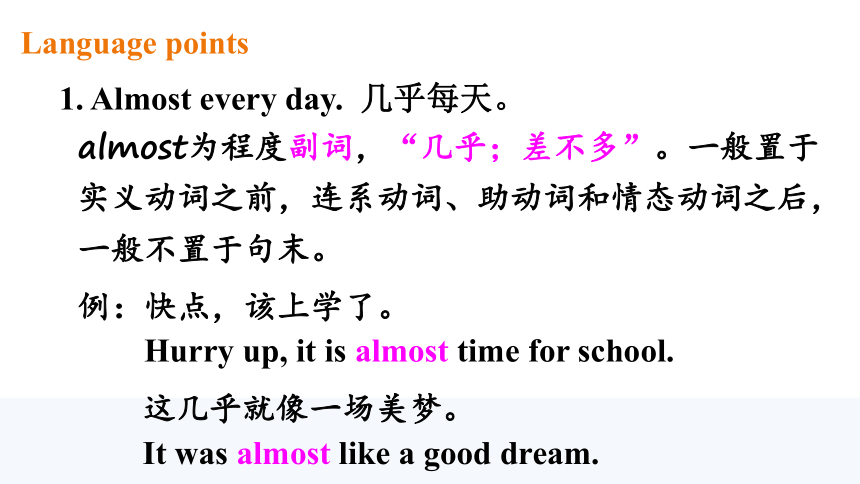
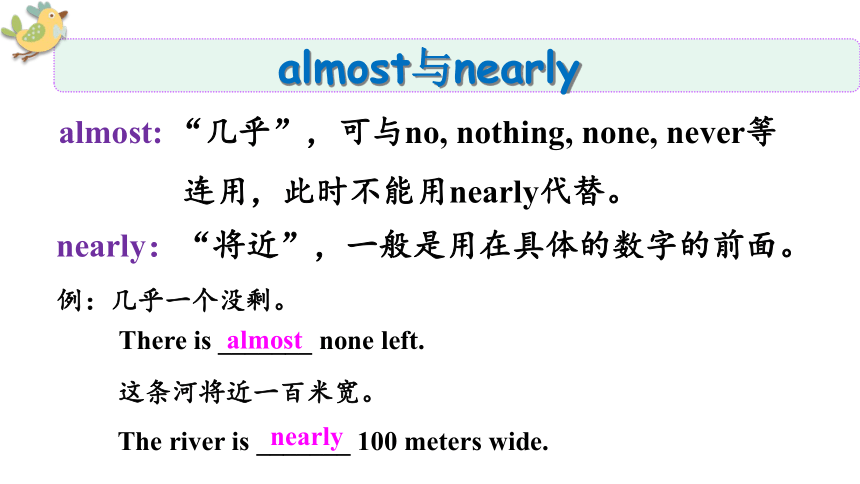
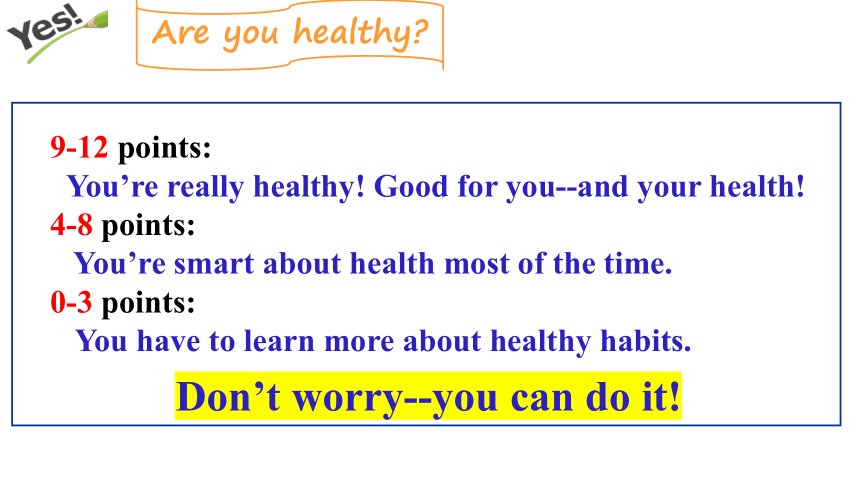
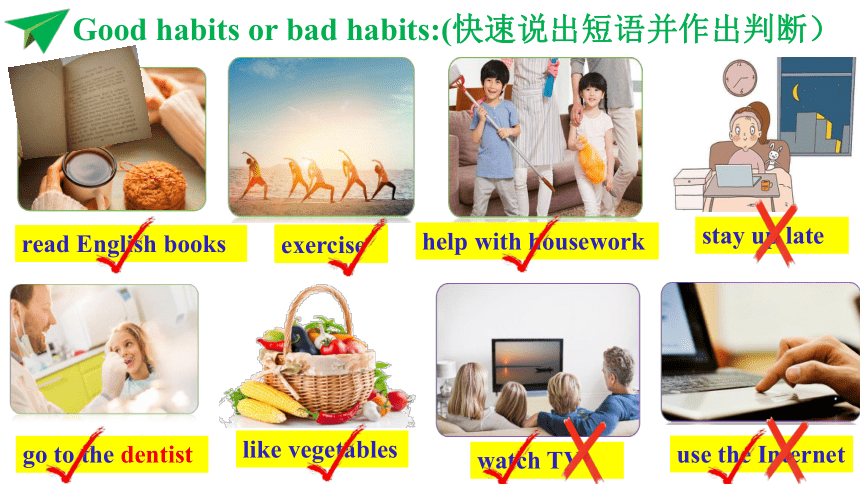
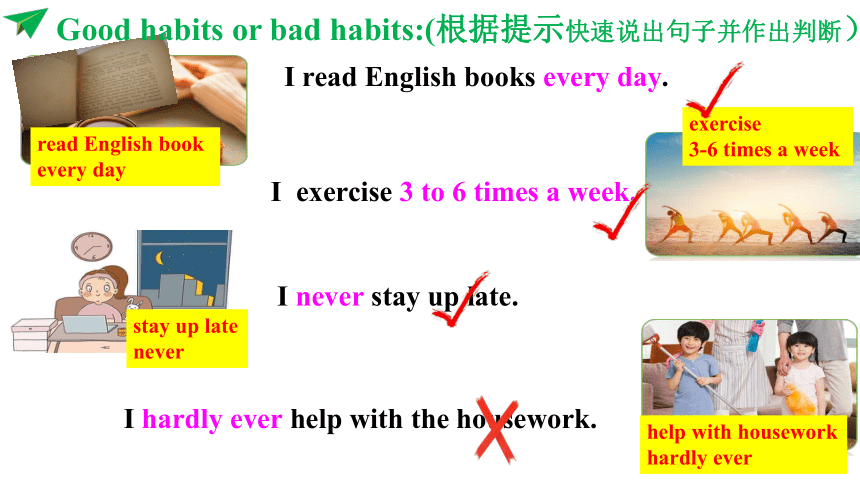

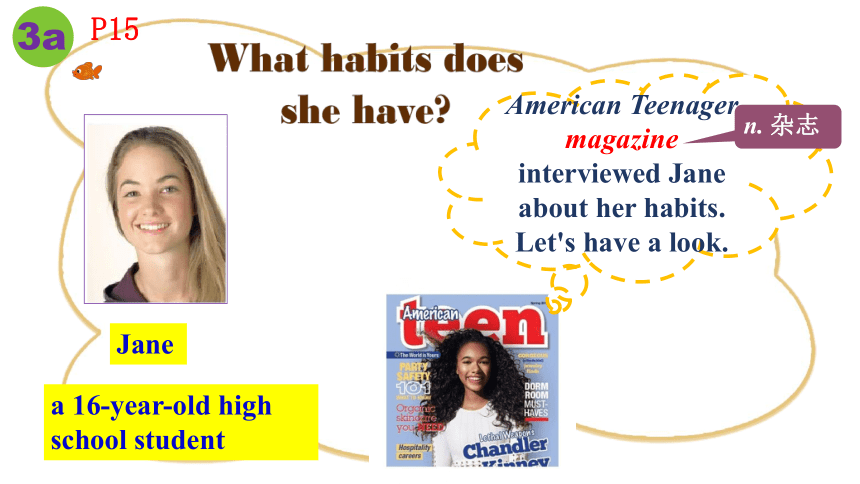
文档简介
(共45张PPT)
Unit 2
How often do you exercise
Section B 3a-3c
1 垃圾食品
2 水果和蔬菜
3 做运动
4 睡得好
5 保持健康
6 不健康的
7对…..有好处(坏处)
8一周三次
9然而
10也
junk food
fruit and vegetables
exercise
sleep well
keep healthy
unhealthy
however
too /
be good/bad for
three times a week
either
Review:
根据中文意思完成句子
1 我有一个健康的生活方式。 I have .
2 我每周锻炼四次。 I exercise .
3 蔬菜和水果对我们的健康有益。
Fruit and vegetables are our .
4 他几乎不吃垃圾食品,尽管它味道好
He eat junk food, it’s delicious.
5 然而, 他也有些不好的习惯。
, he has some , too.
6 他从不去看牙医。 He never .
7 我们应该保持良好的生活习惯。
We should keep living .
a healthy lifestyle
four times a week
are good for health
hardly ever although
However bad habits
goes to the dentist
good habits
Free talk:
Do you think you’re healthy
Are you healthier than your classmates
Take the health quiz.
1.How often do you eat breakfast
a. Never. b. A few times a week. c. Almost every day.
2.How often do you eat fast food
a. Never. b. A few times a week. c. Almost every day.
3.How often do you eat vegetables and fruit
a. Never. b. A few times a week. c. Almost every day.
4.How often do you exercise
a. A few times a year. b. A few times a month.
c.A few times a week.
5.How many hours do you watch TV every week
a. None. b. One to four. c. Five or more.
6.How many hours do you usually sleep at night
a. Less than six. b. Six or seven. c. Eight or more.
P16
1.a=0, b=1,c=2
2.a=2, b=1,c=0
3.a=0, b=1,c=2
4.a=0, b=1,c=2
5.a=2, b=1,c=0
6.a=0, b=1,c=2
1. Almost every day. 几乎每天。
almost为程度副词,“几乎;差不多”。一般置于实义动词之前,连系动词、助动词和情态动词之后,一般不置于句末。
例:快点,该上学了。
Hurry up, it is almost time for school.
这几乎就像一场美梦。
It was almost like a good dream.
Language points
almost: “几乎”,可与no, nothing, none, never等
连用,此时不能用nearly代替。
nearly:“将近”,一般是用在具体的数字的前面。
almost与nearly
例:几乎一个没剩。
这条河将近一百米宽。
The river is _______ 100 meters wide.
There is _______ none left.
nearly
almost
9-12 points:
You’re really healthy! Good for you--and your health!
4-8 points:
You’re smart about health most of the time.
0-3 points:
You have to learn more about healthy habits.
Are you healthy
Don’t worry--you can do it!
Good habits or bad habits:(快速说出短语并作出判断)
read English books
exercise
help with housework
stay up late
watch TV
go to the dentist
exercise
like vegetables
use the Internet
I read English books every day.
I exercise 3 to 6 times a week.
I hardly ever help with the housework.
read English book
every day
exercise
3-6 times a week
help with housework
hardly ever
I never stay up late.
stay up late
never
Good habits or bad habits:(根据提示快速说出句子并作出判断)
I watch TV for over two hours every day.
over two hours every day
once a week
I don’t like vegetables.
don't like
I hardly ever go to the dentist.
go to the dentist
hardly ever
I use the Internet once a week.
Tips:习惯的好坏需要结合活动与其频率来判断!
Jane
a 16-year-old high school student
American Teenager magazine interviewed Jane about her habits. Let's have a look.
n. 杂志
3a
P15
Jane
How often does she...
always/every day
always/every day
usually
often
sometimes
hardly ever
hardly ever
never
3a
Good / Bad habits
√
√
X
√
X
X
X
√
Look at the information in the chart.
Complete the report .
P15
3a
every day
often
hardly ever
usually
sometimes
hardly ever
never
P15
every day
Complete the report .
often
hardly ever
usually
sometimes
hardly ever
never
3a
Complete the report .
Jane is a 16-year-old high school student in the United States. American Teenager magazine asked her about her habits.
Jane has a lot of good habits. She always exercises and she reads books ________. Also, she ________drinks juice and she __________ stays up late.
However, she has some bad habits, too. She _______ watches TV for more than two hours a day, and she __________ eats hamburgers. Her parents are not very happy because she ______ ______helps with housework and she ______ goes to the dentist for teeth cleaning. She says she is afraid.
every day
often
hardly ever
usually
sometimes
hardly
ever
never
1.What’s the topic(话题) of
this article
2.We can divide the passage
into paragraphs.
3
/
/
3.What are the key
sentences of Para 2&3
Beginning
Body
Body
3a
1. Read it aloud together.
● Linking words can make
the article more fluent.
连接词能使文章更流畅。
2. Find out the missing words.
3. Read it again.
1. However
副词,意为“然而,可是”,表示转折关系,可放
在句首、句中和句末。
例:我很饿,但她却给了我一些水。
I was hungry, however, she gave me some water.
可是我父亲没有开车去那里。
My father, however, didn’t drive there.
Language points
2. more than 意为“多于”,相当于over ;
其反义词为less than ,意为“少于” 。
例:回家用时从未超过一个小时。
It never takes more than/over an hour to go home.
他们会在那里呆不到三天。
They’ll stay there for less than three days.
Beginning:介绍个人的信息。
(background)
Body:
____ have/has ____ good habits.
1.____________________
2.____________________
3.____________________
good
However, ____ have/has ____ bad habits.
1.____________________
2.____________________
3.____________________
bad
Ending
Out-
line
Summary:
帮忙做家务
几乎从不
在周末
多久一次
每周一次
每月两次
一周三次
上网
吃垃圾食品
help with housework
hardly ever
on weekends
how often
once a week
twice a month
three times a week
use the Internet /go online
短语储备
Pre-writing
eat junk food
上钢琴课
吃顿健康的早餐
做运动
至少
早早上床睡觉
熬夜
对...有好处
喝牛奶/咖啡/果汁
玩电脑游戏
have piano lessons
eat a healthy breakfast
play sports
at least
go to bed early
stay up late
短语储备
be good for
drink milk/coffee/juice
play computer games
旧习难改
百分之多少
去看牙医
读书
多于
少于
了解更多的...
old habits die hard
how many percent of
go to the dentist
less than
learn more about
短语储备
more than
read books
①自我介绍
1.我叫克莱尔,一个14岁的女孩。
2.我是一名14岁的中学生。
3.现在让我告诉你我的一些习惯。
I’m Claire, a 14-year-old girl.
I'm a 14-year-old middle school student.
句型储备
复合形容词:数词-单数名词(-形容词)
*在句中作定语,不能作表语。
She is 14-year-old. (×) She is a 14-year-old girl. ( √ )
Now let me tell you something about my habits.
②介绍习惯
1.我有许多好习惯。
2.我总是按时到校。
3.我通常吃健康的早餐。
4.放学后我经常打羽毛球。
5.我几乎不熬夜。每晚我至少睡八个小时。
I have a lot of good habits.
句型储备
I usually eat a healthy breakfast.
I always arrive at school on time.
I often play badminton after school.
I hardly ever stay up late, and I sleep at least eight hours every night.
②介绍习惯
6.然而,我也有一些坏习惯。
7.我通常一天看两个多小时的电视。
8.我经常喝可乐,从不喝牛奶。
9.而且,我在家几乎不帮忙做家务。
句型储备
Moreover, I hardly ever help with housework at home.
However, I also have some had habits.
I often drink cola and never drink milk.
I usually watch TV for more than two hours a day.
③表达看法
1.健康胜过财富。
2.我知道这些坏习惯对我没好处,我将尽力改掉它们。
3.过健康的生活是重要的。(It's+adj. (for sb)+to do sth.)
4.这些就是我的生活习惯。你的呢?
Health is better than wealth.
句型储备
I know these bad habits are not good for me. I will try to break them.
It's important to have a healthy life.
These are my living habits. What about yours
Complete the chart with your own information. In the last column, use expressions like always, every day, twice a week and never.
Activities How often
Good habits
Bad habits
3b
P15
Tips:习惯的好坏需要结合活动与其频率来判断!
Habits Activities How often
Good habits Exercise Read books Eat fruit Drink milk Stay up late
every day
always
twice a week
every day
never
Bad habits Watch TV for over 2 hours Use the Internet Eat hamburgers Help with housework Go to the dentist
always
often
every day
hardly ever
never
_____________________________________
_____________________________________
_____________________________________
_____________________________________
_____________________________________
_____________________________________
Write a report about your good and bad habits. Say how often you do things. Use the report in 3a as an example.
3c
While-writing
【思路点拨】
第一步:审题:人称 . 时态 .
第二步:列提纲。
一般现在时
第一人称
I have a lot of good habits. I always... Also, I often.... However, I have some bad habits, too. I usually....
表达看法
总
分
总
Pre-writing
Outline
Beginning
Body
Ending
I am/My name's....
I have lots of good habits....
However,I have some bad habits...
I exercise every day....
I eat fruit every day...
......
Introduce yourself
I always watch TV for over two hours....
I often eat junk food...
......
I know the bad habits are bad for me.I will try my best to ....
01
Structure
1. Topic (介绍话题)
2. Good habits
3. Bad habits
02
Adverbs of frequency
(always/usually/never...)
03
Opinions(观点)
(do sth because/so...)
04
Linking words
(and,so,because, …)
My Habits
While writing
Writing tips:
Hello, everyone. My name is...
I have a lot of good habits.
However, I have some bad habits, too.
All in all, I have a healthy lifestyle.
Hello ,everybody,my name’s Tony,I’m a 14-year-old boy in NO.1 Middle School.Now I’ll tell you something about my living habits.
I have many good habits.I always get up early and exercise for half an hour.And I usually eat a lot of fruit for breakfast.Also,I always help mum with housework.I usually read books after shool,I like reading,it is fun.
However,I have some bad habits,too.I sometimes eat junk food,because it’s delicious,and I often watch TV for more than 2 hours a day.The TV shows are so wonderful that I want to see them again and again.
I know that good habits lead a good life,so I am trying to break my bad habits,do you have any bad habits Let’s start together!
After writing
After reading my classmate's article(文章), I know
the topic(话题) at the beginning(开头). YES/ NO
his/her good and bad habits. YES/ NO
people's opinions (happy/angry...). YES/ NO
In my classmate's article, I see
adverbs of frequency (always, usually...). YES/ NO
clean and good handwriting(书写). YES/ NO
linking words(and, but, however, because, ... ). YES/ NO
Peer checklist 同伴评价表
My classmate can get in total(总共).
假如你是李华,请根据以下提示写一篇短文介绍你的习惯,不少于80词,可适当发挥。
要点:1.去年有很多坏习惯:睡眠不足,上学经常
迟到;几乎不吃早餐;不爱锻炼。
2.现在有一些好的生活习惯。(写三个)
3.写出感悟。
Homework
Complete the chart with activities you do and don’t do. What about your mother/ father
always usually often sometimes hardly ever never
I
My mother or father
play
basketball
read books
eat
hamburgers
drink juice
watch TV
get up
early
running
read newspapers
eat chicken
drink tea
use the Internet
get up early
1
2. Write five sentences using the information
above.
I hardly ever watch TV.
I always play basketball after school.
My father always plays chess on weekends.
I usually read books on weekends.
My father sometimes drinks tea.
3. Fill in the blanks in the conversation.
A: What do Tom and Mike do on weekends
B: They sometimes go to the museum.
A: do they go to the shopping center
B: ever. Maybe about twice a month.
A: do they watch TV
B: Mike never watches TV, but Tom watches TV
______ day.
A: Oh, I’m just like Tom. I watch TV, too.
usually
How often
Hardly
How often
every
always
1. We ______ go out to eat but not very often.
A. usually B. always
C. never D. sometimes
2. — ________ do you read English
— Every evening.
A. How long B. How often
C. How far D. How much
单项选择。
3. Maria likes ______ every morning.
A. running B. ran C. runs D. run
4. My sister likes fruit _______ she doesn’t like vegetables.
A. and B. but C. or D. also
5. —_____ do you eat junk food —About once a week.
A. How B. How many
C. How long D. How often
5. —_____ do you eat junk food —About once a week.
A. How B. How many
C. How long D. How often
Do a survey in your family, using the questions and charts in Part 4.
Preview the new words and expressions in Unit 3.
Thank you!
Unit 2
How often do you exercise
Section B 3a-3c
1 垃圾食品
2 水果和蔬菜
3 做运动
4 睡得好
5 保持健康
6 不健康的
7对…..有好处(坏处)
8一周三次
9然而
10也
junk food
fruit and vegetables
exercise
sleep well
keep healthy
unhealthy
however
too /
be good/bad for
three times a week
either
Review:
根据中文意思完成句子
1 我有一个健康的生活方式。 I have .
2 我每周锻炼四次。 I exercise .
3 蔬菜和水果对我们的健康有益。
Fruit and vegetables are our .
4 他几乎不吃垃圾食品,尽管它味道好
He eat junk food, it’s delicious.
5 然而, 他也有些不好的习惯。
, he has some , too.
6 他从不去看牙医。 He never .
7 我们应该保持良好的生活习惯。
We should keep living .
a healthy lifestyle
four times a week
are good for health
hardly ever although
However bad habits
goes to the dentist
good habits
Free talk:
Do you think you’re healthy
Are you healthier than your classmates
Take the health quiz.
1.How often do you eat breakfast
a. Never. b. A few times a week. c. Almost every day.
2.How often do you eat fast food
a. Never. b. A few times a week. c. Almost every day.
3.How often do you eat vegetables and fruit
a. Never. b. A few times a week. c. Almost every day.
4.How often do you exercise
a. A few times a year. b. A few times a month.
c.A few times a week.
5.How many hours do you watch TV every week
a. None. b. One to four. c. Five or more.
6.How many hours do you usually sleep at night
a. Less than six. b. Six or seven. c. Eight or more.
P16
1.a=0, b=1,c=2
2.a=2, b=1,c=0
3.a=0, b=1,c=2
4.a=0, b=1,c=2
5.a=2, b=1,c=0
6.a=0, b=1,c=2
1. Almost every day. 几乎每天。
almost为程度副词,“几乎;差不多”。一般置于实义动词之前,连系动词、助动词和情态动词之后,一般不置于句末。
例:快点,该上学了。
Hurry up, it is almost time for school.
这几乎就像一场美梦。
It was almost like a good dream.
Language points
almost: “几乎”,可与no, nothing, none, never等
连用,此时不能用nearly代替。
nearly:“将近”,一般是用在具体的数字的前面。
almost与nearly
例:几乎一个没剩。
这条河将近一百米宽。
The river is _______ 100 meters wide.
There is _______ none left.
nearly
almost
9-12 points:
You’re really healthy! Good for you--and your health!
4-8 points:
You’re smart about health most of the time.
0-3 points:
You have to learn more about healthy habits.
Are you healthy
Don’t worry--you can do it!
Good habits or bad habits:(快速说出短语并作出判断)
read English books
exercise
help with housework
stay up late
watch TV
go to the dentist
exercise
like vegetables
use the Internet
I read English books every day.
I exercise 3 to 6 times a week.
I hardly ever help with the housework.
read English book
every day
exercise
3-6 times a week
help with housework
hardly ever
I never stay up late.
stay up late
never
Good habits or bad habits:(根据提示快速说出句子并作出判断)
I watch TV for over two hours every day.
over two hours every day
once a week
I don’t like vegetables.
don't like
I hardly ever go to the dentist.
go to the dentist
hardly ever
I use the Internet once a week.
Tips:习惯的好坏需要结合活动与其频率来判断!
Jane
a 16-year-old high school student
American Teenager magazine interviewed Jane about her habits. Let's have a look.
n. 杂志
3a
P15
Jane
How often does she...
always/every day
always/every day
usually
often
sometimes
hardly ever
hardly ever
never
3a
Good / Bad habits
√
√
X
√
X
X
X
√
Look at the information in the chart.
Complete the report .
P15
3a
every day
often
hardly ever
usually
sometimes
hardly ever
never
P15
every day
Complete the report .
often
hardly ever
usually
sometimes
hardly ever
never
3a
Complete the report .
Jane is a 16-year-old high school student in the United States. American Teenager magazine asked her about her habits.
Jane has a lot of good habits. She always exercises and she reads books ________. Also, she ________drinks juice and she __________ stays up late.
However, she has some bad habits, too. She _______ watches TV for more than two hours a day, and she __________ eats hamburgers. Her parents are not very happy because she ______ ______helps with housework and she ______ goes to the dentist for teeth cleaning. She says she is afraid.
every day
often
hardly ever
usually
sometimes
hardly
ever
never
1.What’s the topic(话题) of
this article
2.We can divide the passage
into paragraphs.
3
/
/
3.What are the key
sentences of Para 2&3
Beginning
Body
Body
3a
1. Read it aloud together.
● Linking words can make
the article more fluent.
连接词能使文章更流畅。
2. Find out the missing words.
3. Read it again.
1. However
副词,意为“然而,可是”,表示转折关系,可放
在句首、句中和句末。
例:我很饿,但她却给了我一些水。
I was hungry, however, she gave me some water.
可是我父亲没有开车去那里。
My father, however, didn’t drive there.
Language points
2. more than 意为“多于”,相当于over ;
其反义词为less than ,意为“少于” 。
例:回家用时从未超过一个小时。
It never takes more than/over an hour to go home.
他们会在那里呆不到三天。
They’ll stay there for less than three days.
Beginning:介绍个人的信息。
(background)
Body:
____ have/has ____ good habits.
1.____________________
2.____________________
3.____________________
good
However, ____ have/has ____ bad habits.
1.____________________
2.____________________
3.____________________
bad
Ending
Out-
line
Summary:
帮忙做家务
几乎从不
在周末
多久一次
每周一次
每月两次
一周三次
上网
吃垃圾食品
help with housework
hardly ever
on weekends
how often
once a week
twice a month
three times a week
use the Internet /go online
短语储备
Pre-writing
eat junk food
上钢琴课
吃顿健康的早餐
做运动
至少
早早上床睡觉
熬夜
对...有好处
喝牛奶/咖啡/果汁
玩电脑游戏
have piano lessons
eat a healthy breakfast
play sports
at least
go to bed early
stay up late
短语储备
be good for
drink milk/coffee/juice
play computer games
旧习难改
百分之多少
去看牙医
读书
多于
少于
了解更多的...
old habits die hard
how many percent of
go to the dentist
less than
learn more about
短语储备
more than
read books
①自我介绍
1.我叫克莱尔,一个14岁的女孩。
2.我是一名14岁的中学生。
3.现在让我告诉你我的一些习惯。
I’m Claire, a 14-year-old girl.
I'm a 14-year-old middle school student.
句型储备
复合形容词:数词-单数名词(-形容词)
*在句中作定语,不能作表语。
She is 14-year-old. (×) She is a 14-year-old girl. ( √ )
Now let me tell you something about my habits.
②介绍习惯
1.我有许多好习惯。
2.我总是按时到校。
3.我通常吃健康的早餐。
4.放学后我经常打羽毛球。
5.我几乎不熬夜。每晚我至少睡八个小时。
I have a lot of good habits.
句型储备
I usually eat a healthy breakfast.
I always arrive at school on time.
I often play badminton after school.
I hardly ever stay up late, and I sleep at least eight hours every night.
②介绍习惯
6.然而,我也有一些坏习惯。
7.我通常一天看两个多小时的电视。
8.我经常喝可乐,从不喝牛奶。
9.而且,我在家几乎不帮忙做家务。
句型储备
Moreover, I hardly ever help with housework at home.
However, I also have some had habits.
I often drink cola and never drink milk.
I usually watch TV for more than two hours a day.
③表达看法
1.健康胜过财富。
2.我知道这些坏习惯对我没好处,我将尽力改掉它们。
3.过健康的生活是重要的。(It's+adj. (for sb)+to do sth.)
4.这些就是我的生活习惯。你的呢?
Health is better than wealth.
句型储备
I know these bad habits are not good for me. I will try to break them.
It's important to have a healthy life.
These are my living habits. What about yours
Complete the chart with your own information. In the last column, use expressions like always, every day, twice a week and never.
Activities How often
Good habits
Bad habits
3b
P15
Tips:习惯的好坏需要结合活动与其频率来判断!
Habits Activities How often
Good habits Exercise Read books Eat fruit Drink milk Stay up late
every day
always
twice a week
every day
never
Bad habits Watch TV for over 2 hours Use the Internet Eat hamburgers Help with housework Go to the dentist
always
often
every day
hardly ever
never
_____________________________________
_____________________________________
_____________________________________
_____________________________________
_____________________________________
_____________________________________
Write a report about your good and bad habits. Say how often you do things. Use the report in 3a as an example.
3c
While-writing
【思路点拨】
第一步:审题:人称 . 时态 .
第二步:列提纲。
一般现在时
第一人称
I have a lot of good habits. I always... Also, I often.... However, I have some bad habits, too. I usually....
表达看法
总
分
总
Pre-writing
Outline
Beginning
Body
Ending
I am/My name's....
I have lots of good habits....
However,I have some bad habits...
I exercise every day....
I eat fruit every day...
......
Introduce yourself
I always watch TV for over two hours....
I often eat junk food...
......
I know the bad habits are bad for me.I will try my best to ....
01
Structure
1. Topic (介绍话题)
2. Good habits
3. Bad habits
02
Adverbs of frequency
(always/usually/never...)
03
Opinions(观点)
(do sth because/so...)
04
Linking words
(and,so,because, …)
My Habits
While writing
Writing tips:
Hello, everyone. My name is...
I have a lot of good habits.
However, I have some bad habits, too.
All in all, I have a healthy lifestyle.
Hello ,everybody,my name’s Tony,I’m a 14-year-old boy in NO.1 Middle School.Now I’ll tell you something about my living habits.
I have many good habits.I always get up early and exercise for half an hour.And I usually eat a lot of fruit for breakfast.Also,I always help mum with housework.I usually read books after shool,I like reading,it is fun.
However,I have some bad habits,too.I sometimes eat junk food,because it’s delicious,and I often watch TV for more than 2 hours a day.The TV shows are so wonderful that I want to see them again and again.
I know that good habits lead a good life,so I am trying to break my bad habits,do you have any bad habits Let’s start together!
After writing
After reading my classmate's article(文章), I know
the topic(话题) at the beginning(开头). YES/ NO
his/her good and bad habits. YES/ NO
people's opinions (happy/angry...). YES/ NO
In my classmate's article, I see
adverbs of frequency (always, usually...). YES/ NO
clean and good handwriting(书写). YES/ NO
linking words(and, but, however, because, ... ). YES/ NO
Peer checklist 同伴评价表
My classmate can get in total(总共).
假如你是李华,请根据以下提示写一篇短文介绍你的习惯,不少于80词,可适当发挥。
要点:1.去年有很多坏习惯:睡眠不足,上学经常
迟到;几乎不吃早餐;不爱锻炼。
2.现在有一些好的生活习惯。(写三个)
3.写出感悟。
Homework
Complete the chart with activities you do and don’t do. What about your mother/ father
always usually often sometimes hardly ever never
I
My mother or father
play
basketball
read books
eat
hamburgers
drink juice
watch TV
get up
early
running
read newspapers
eat chicken
drink tea
use the Internet
get up early
1
2. Write five sentences using the information
above.
I hardly ever watch TV.
I always play basketball after school.
My father always plays chess on weekends.
I usually read books on weekends.
My father sometimes drinks tea.
3. Fill in the blanks in the conversation.
A: What do Tom and Mike do on weekends
B: They sometimes go to the museum.
A: do they go to the shopping center
B: ever. Maybe about twice a month.
A: do they watch TV
B: Mike never watches TV, but Tom watches TV
______ day.
A: Oh, I’m just like Tom. I watch TV, too.
usually
How often
Hardly
How often
every
always
1. We ______ go out to eat but not very often.
A. usually B. always
C. never D. sometimes
2. — ________ do you read English
— Every evening.
A. How long B. How often
C. How far D. How much
单项选择。
3. Maria likes ______ every morning.
A. running B. ran C. runs D. run
4. My sister likes fruit _______ she doesn’t like vegetables.
A. and B. but C. or D. also
5. —_____ do you eat junk food —About once a week.
A. How B. How many
C. How long D. How often
5. —_____ do you eat junk food —About once a week.
A. How B. How many
C. How long D. How often
Do a survey in your family, using the questions and charts in Part 4.
Preview the new words and expressions in Unit 3.
Thank you!
同课章节目录
- Unit 1 Where did you go on vacation?
- Section A
- Section B
- Unit 2 How often do you exercise?
- Section A
- Section B
- Unit 3 I'm more outgoing than my sister.
- Section A
- Section B
- Unit 4 What's the best movie theater?
- Section A
- Section B
- Unit 5 Do you want to watch a game show?
- Section A
- Section B
- Unit 6 I'm going to study computer science.
- Section A
- Section B
- Unit 7 Will people have robots?
- Section A
- Section B
- Unit 8 How do you make a banana milk shake?
- Section A
- Section B
- Unit 9 Can you come to my party?
- Section A
- Section B
- Unit 10 If you go to the party, you'll have a grea
- Section A
- Section B
